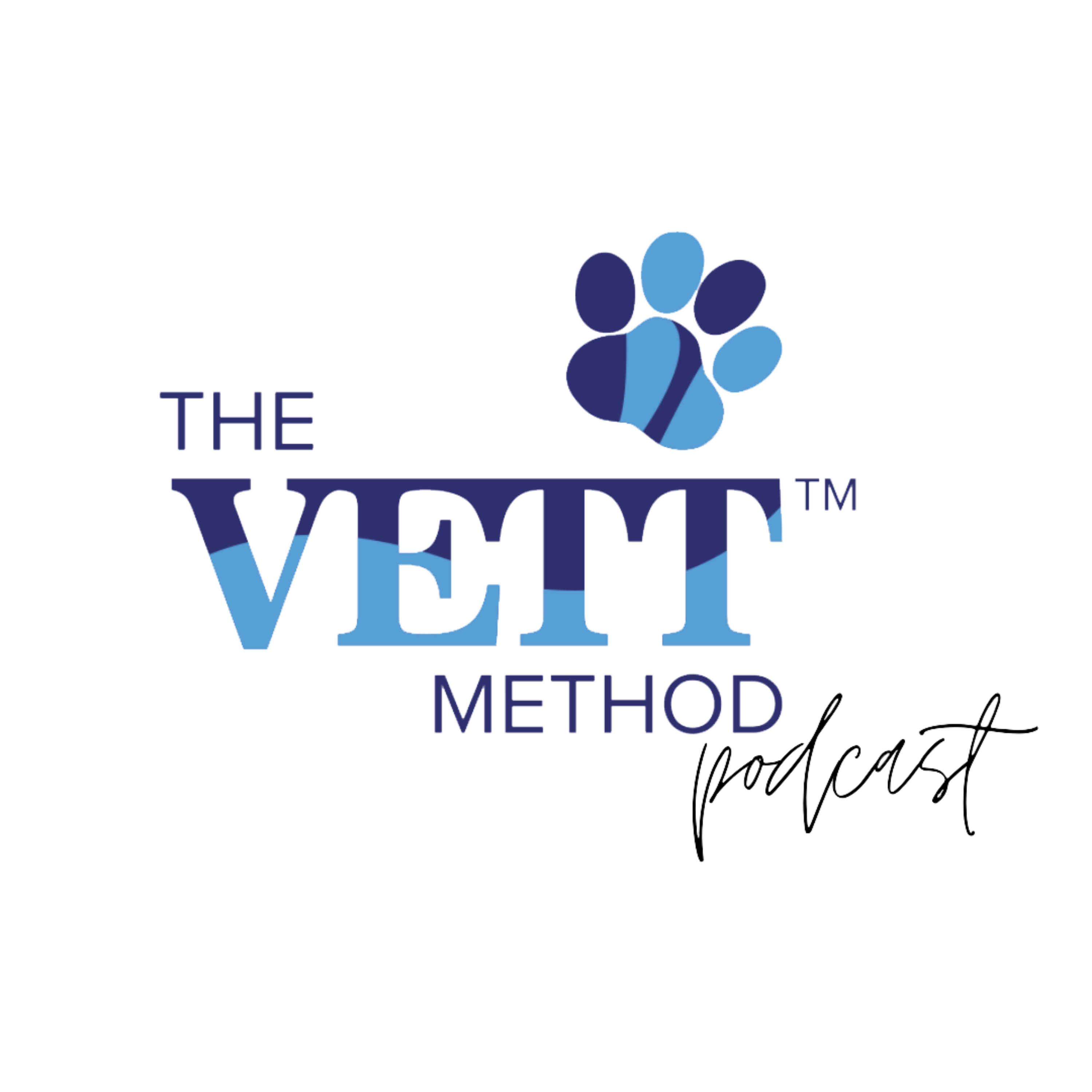Episodes
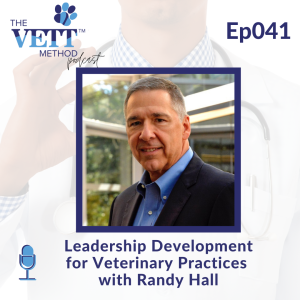
Thursday Sep 01, 2022
Leadership Development for Veterinary Practices with Randy Hall
Thursday Sep 01, 2022
Thursday Sep 01, 2022
Do you want to build a better culture and make veterinary practice a happy place for both humans and animals to be in?
Have you always wanted to know how to thrive in veterinary medicine rather than barely making it through the day and just really surviving it?
If your answer is yes, then you’re in for an awesome treat today! Join us as we hear what Randy Hall has to say when it comes to creating a different kind of culture at work, coupled with a fully engaged team!
Randy Hall serves as a consultant, coach, and facilitator to help veterinary practices create a culture that engages employees, dramatically improves results, and sustains growth.
In this episode, Randy discusses things that hinder organizations – especially hospitals – when it comes to building a better and positive culture at work with a fully engaged team. Also, he explains how knowing their definition of success leads to such a workplace.
What you will learn from this episode:
- Why going for policies and punishments don’t really work well on creating a different but positive culture in the veterinary practice;
- How knowing and understanding the team or the organization’s definition of success helps people work towards achieving that goal;
- Why team engagement plays a huge role on changing the culture, from just surviving the practice to actually thriving in it
“Top tip will be defining success for your practice or your team or your group of people. When we are moving toward something as a group of people, it starts to change the game a little bit. And when we're focused on those things, we start to change the way we approach our work.”
– Randy Hall
Topics Covered:
01:20 – Randy describes his ideal client: Anyone who wants to build a better culture and a happier practice
02:26 – Problem he solves for his clients: The feeling that they're surviving veterinary medicine instead of thriving in it, and wanting to make positive changes without struggle but not knowing how and where to start
03:30 – The typical symptoms / pain points: The inefficiency, poor communication, increased number of mistakes, and the drama. Symptoms for individuals are burnout, additional stress, and symptoms for organizations is that retention rates go down
05:17 – The mistakes: “They start to double down on things like policies or compliance or punishments or even instructions and micromanagement.”
10:01 – Randy’s Valuable Free Action: “Define success for your practice or your team or your group of people.”
13:04 – Randy’s Valuable Free Resource: Visit VetLead’s website and Facebook page and take advantage of the resources they have to help you build a fully engaged team.
14:17 – Q: How do we teach leadership to veterinary professionals? A: “Leadership is a set of processes. We don't have to guess about it anymore. We know about the neuroscience. We know how humans respond to feedback. We know what kind of coaching works in an environment to help people perform at a higher level, just because there's been enough research done on it. There are new processes, approaches, models, systems, tools and habits we can build as leaders that will help us get the results we really want rather than just the ones our impulses will kind of lead us to or our most comfortable style will lead us to, because it’s not the thing.”
Key Takeaways:
“Disengaged people just don't do work well.” – Randy Hall
“Policies really don't work. Increased consequences really don't work. There may be a human or two inside our practice that we need to have a different kind of conversation with, and consequences are part of that; that's fine. But let's not change the entire infrastructure and feeling in our business just because we've got a couple of people that aren't doing the right things.” – Randy Hall
“Our brains are so much better at moving toward something than away from something. When we're moving away from something, it's a stressful survival kind of situation, and we don't do it well and it doesn't feel pleasant while it's happening; we're just running from the tiger. But when we are moving toward something as a group of people, it starts to change the game a little bit. And when we're focused on those things, we start to change the way we approach our work.” – Randy Hall
People / Resources Mentioned:
- VetLead: https://www.vetlead.com/
- VetLead LinkedIn page: https://www.linkedin.com/company/vetlead/
Ways to Connect with Randy Hall:
- Website: https://www.vetlead.com/
- Email: hall@vetlead.com
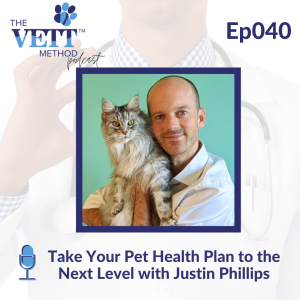
Thursday Jul 28, 2022
Take Your Pet Health Plan to the Next Level with Justin Phillips
Thursday Jul 28, 2022
Thursday Jul 28, 2022
Do you find it hard doing business in the practice around this time where everything is becoming more digital? Are you getting so busy, trying to survive in your day-to-day, that you now have little to no time to attend to the roots of all the problems?
Marketing plays a key role in the success of a practice, but more often than not, people have become so used to just doing the work without experiencing it from the client’s perspective.
Learn from this episode as our guest talks about our modern marketing needs, helping us not turn blind to how our practice is operating!
Justin Phillips is a Veterinary Practice Marketing & Business Consultant and provides proven, industry-leading marketing and veterinary business advice to vet practices around the world. Justin loves making things better, growing practices, creating great workspaces, and extending pets’ lives by removing barriers to care. He is passionate about coaching and inspiring others to raise the standard of marketing across the veterinary industry. I guess you could say that he’s a Marketing Nerd, and he is also a Crazy Cat guy!
In this episode, Justin discusses the critical value of both marketing and health plans in veterinary practice, especially in this digital world.
What you will learn from this episode:
- Why we need to tell better, more compelling and authentic stories when it comes to recruiting new medical professionals to join the practice;
- Why it’s advisable that vet practitioners look outside of the practice and reach out to people who can be of help in solving modern day problems; and
- Why people in the practice should look at the business and experience it through the eyes of a pet owner
“I would encourage people to look outside of their practice, look outside their bubble, and see who they can call on to help them with it. Listen to those people and expand your knowledge. Rather than trying to do it all yourself, how can you augment your skills and your services that your practice has to solve those problems faster?”
– Justin Phillips
Topics Covered:
03:13 – Justin describes his ideal client: Independent veterinary practices in the UK who needs help in solving marketing problems
04:20 – Problem he solves for his clients: Taking progress on their digital journey -- getting their website to do more stuff, and engaging and retaining their team, helping them be the best they can be, while improving skills, sharing better stories to be able to recruit new medical professionals in the practice
07:23 – The typical symptoms/pain points: “They maybe do what they've always done so they get what they've always got, but I think those practices are just so busy getting through the day to day and surviving that they don't have time to step back on the luxury to spend the time telling an authentic story in terms of recruitment or researching which technologies out there will help them with a specific problem.”
10:14 – The mistakes: Trying to solve all those problems themselves and try and take on too much of an overload on their already busy schedule.
11:47 – Justin’s Valuable Free Action: “Look at your business and experience your practice through the eyes of a pet owner.”
13:32 – Justin’s Valuable Free Resource: Visit https://www.practicemadepurrfect.com to learn more about veterinary practice.
15:15 – Q: What percentage of clients can a practice realistically move on to a health plan, and where is the limit? A: “I think, in practice, we have a glass ceiling, which is based on our own experiences in that particular practice. So, if that's the question, the answer is I don't know. But I'm intrigued to see how far we can take this by removing barriers to care, by removing our own preconceptions around what is that glass ceiling and seeing how far we can push it. I think 70% is achievable if we look at each element of the health plan from how we joined, how we retain people to the bundle of products and services in a health plan. I don't see any reason we can't surpass 70%.”
Key Takeaways:
“As a practice, we've got to tell more compelling stories, and it's now about what we as a practice can do for the candidate rather than what the candidate can do for the practice.” – Justin Phillips
“They maybe do what they've always done so they get what they've always got, but I think those practices are just so busy getting through the day-to-day and surviving that they don't have time to step back on the luxury to spend the time telling an authentic story in terms of recruitment or researching which technologies out there will help them with a specific problem. And these things are hard to solve, so it's absolutely nobody's fault. I spent the last ten years thinking about veterinary practice and the business side, day and night, thinking, how could this work better? How could we change stuff? And so, a lot of trial and error.” – Justin Phillips
People / Resources Mentioned:
- Practice Made Purrfect: https://www.practicemadepurrfect.com
- Pet Health Plans: https://www.practicemadepurrfect.com/pet-health-plans-for-vets
Ways to Connect with Justin Phillips:
- Email: justin@practicemadepurrfect.com
- Website: https://www.practicemadepurrfect.com
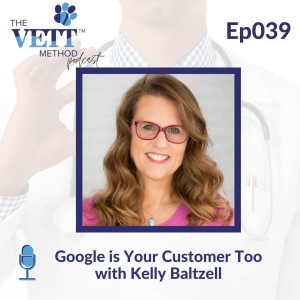
Thursday Apr 21, 2022
Google is Your Customer Too with Kelly Baltzell
Thursday Apr 21, 2022
Thursday Apr 21, 2022
How do you communicate with people as you go on with your daily life?
Marketing is something veterinarians find hard to get their head around. We used to be all about medicine, but marketing has already become a necessity in any practice there is in life.
It isn’t what we’re good at, but at some point, we’re also aware that we need it to move forward. So with the digital market continuously growing in today’s time, how do you find a marketing company that speaks the language of your mind?
Remember that marketing is conversations and perceptions that can affect all aspects of the practice you’re so passionate about. Join us in this episode as we learn why being educated is the key to finding the right marketing guy.
Kelly Baltzell is the President and CEO of Beyond Indigo Pets which she founded in 1997. Under her leadership, Beyond Indigo Pets has developed all types of veterinary websites and marketing that now reaches millions of people each year in multiple countries. Since 2015, Beyond Indigo has been a certified Google AdWords Partner.
Additionally, since 2011, Kelly has been a monthly columnist for the American Animal Hospital Association’s Marketlink. She has also spoken and been published in Australia, New Zealand, Canada, and the UK. Kelly graduated from George Washington University with a degree in International Affairs and Economics and received her master’s degree in Counselling and Psychology from St. Mary’s.
In this episode, Kelly talks about marketing as well as the importance of being educated about it. Here, she shares why you should be aware of what it is that you truly want in order for you to be able to find the right marketing company that resonates best with your needs.
What you will learn from this episode:
- How it is that Google and other platforms such as Facebook are also your customers;
- The importance of taking the time to take note of your internal needs – what it is that you actually want – as you weigh whether you and the marketing company are a good fit;
- Why it’s a must for you to be an educated consumer in order to keep yourself updated on marketing
“Partly, the lack and the franticness around marketing in the veterinary space is the lack of knowledge. You don’t have to be an expert in marketing, but you need to be an educated consumer. You need to know what’s going on out there so you can have conversations. Please take the moment and learn.” – Kelly Baltzell
Topics Covered:
01:45 – Kelly describes her ideal client: A person or a practice who wants to embrace marketing, who cannot keep up with change, and wants to go out of their comfort zone
05:22 – Problem she solves for her clients: The lack of knowledge about marketing
08:33 – The typical symptoms/pain points: The amount of overload that they cannot handle anymore: getting overwhelmed, not knowing where to start, poor running of websites and pages
09:58 – The mistakes: Franticness, going to a convention and finding the first marketing booth that you find without thinking if it’s a good fit and style
15:11 – Kelly’s Valuable Free Action: “First of all, take a deep breath. Get your favorite beverage, adult or otherwise. Take a little bit of time, and just stop, and write down what your absolute needs are, the internal needs that you need from a marketing company. Then you go find companies and research them.”
17:57 – Kelly’s Valuable Free Resource: Visit Beyond Indigo Pets’ website, sign up, and get a free consult, as you try out their free website checker coupled with a report afterward
19:03 – Q: What can people do for themselves to keep themselves updated on marketing? A: “Partly, the lack and the franticness around marketing in the veterinary space is the lack of knowledge. You don’t have to be an expert in marketing, but you need to be an educated consumer. You need to know what’s going on out there so you can have conversations. Please take the moment and learn.”
Key Takeaways:
“Google and other platforms are also one of your customers. All those practices, regardless of your walk of life in the veterinary space, focus on existing or new clients. Google, Facebook, and all those people. Those are actually doing more marketing for practices. That’s one of your clients.” – Kelly Baltzell
“You only have to look at the whole playing field versus just focusing on one thing and thinking marketing is only for new clients. No; marketing has a lot more to it.” – Kelly Baltzell
“Your online presence now is your new lobby. That’s where people see you. That’s where they’re having conversations.” – Kelly Baltzell
“Marketing is a partnership, so not everybody is a good fit with everybody. Knowing thyself is the first step of finding the people.” – Kelly Baltzell
“In any business world, you’d want to trust your partner that you know would have your back, and you don’t have to keep going back to ‘are you doing your job?’ because that takes time that you don’t have.” – Kelly Baltzell
“Learn enough to know at least what you’re paying for.” – Kelly Baltzell
People / Resources Mentioned:
Beyond Indigo Pets: https://www.beyondindigopets.com/
Ways to Connect with Kelly Baltzell:
Email: kelly@beyondindigo.com
Website: https://www.beyondindigopets.com/
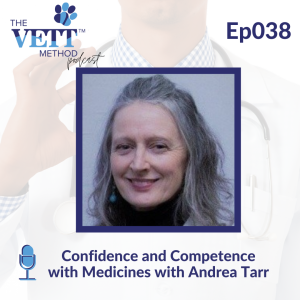
Thursday Apr 14, 2022
Confidence and Competence with Medicines with Andrea Tarr
Thursday Apr 14, 2022
Thursday Apr 14, 2022
Have you been experiencing a lack of confidence when making decisions about medicines because of not having all the relevant information you need in the practice? Do you feel the continuously growing population of free resources everywhere, thus resulting in confusion about what’s of help and what isn’t?
Medicines are an integral part of everyone’s day in veterinary practice. It’s of great importance that we become not only confident, but also competent in handling, prescribing, and dispensing it as we communicate with clients.
With that, be in for a treat today as we learn about efficient medicines management that will save time and money, is focused on client welfare and safety, and will help protect the environment that we’re all living in!
Andrea Tarr is a registered pharmacist and medicines information specialist, and is the Founder and Director of Veterinary Prescriber, an online independent reference and learning resource on veterinary medicines for veterinary professionals.
In this episode, Andrea educates us about the importance of independent, evidence-based, and practical information on all aspects of veterinary medicines as she discusses the consequences of having no access to such in the practice.
What you will learn from this episode:
- How a large number of scattered resources in the practice lead to a lack of confidence in prescribing medicines in vet med;
- Why you shouldn’t rely on single resources, pharmaceutical company information, and forums when looking for information about medicines; and
- The importance of independent, evidence-based, and practical information on all aspects of veterinary medicines
“There’s a lot of free information out there. A lot of people produce free information. But I think people should ask themselves if the information is free, who is paying for it and why? Because information is often used in order to sell something else. And it takes a lot of time and effort to produce high-quality information.” – Andrea Tarr
Topics Covered:
01:37 – Andrea describes her ideal client: Anyone who wants to use medicines in the best interest of their patients, clients, and the environment / all vets in vet practices
02:20 – Problem she solves for her clients: Bringing together and making sense of all the scattered information about veterinary medicine everywhere.
07:02 – The typical symptoms/pain points: Not knowing where to look for information on medicines, and lack of confidence in decision-making and communication with clients
08:28 – The mistakes: Relying on single resources which might not be of help, relying on pharmaceutical company information, and asking people in forums
10:38 – Andrea’s Valuable Free Action: “Find out the quantity and value of medicines that are thrown away, because that will be a really good starting point for making changes and finding out where you can make savings.”
11:38 – Andrea’s Valuable Free Resource: Visit Veterinary Prescriber’s website and blog page to be updated about medicine news
13:04 – Q: Why is it important to be independent? A: “We’re funded by subscription, by the people who want to use the information. We don’t take any sponsorship or advertising. What that means is we can produce information that’s completely objective, trustworthy, and reliable.”
Key Takeaways:
“Keeping up to date on medicines is a professional necessity for people working in veterinary practice.” – Andrea Tarr
“Companies want to point out the benefits of their products, obviously, and not mention the disadvantages. If you’re trying to compare products by asking all the different companies, you’re gonna end up confused because they will all tell you that theirs is the best.” – Andrea Tarr
“Forums can be used for all kinds of things, but it's an inherently unreliable thing to do if you’re looking for information about medicines.” – Andrea Tarr
“Find out the quantity and value of medicines that are thrown away, because that will be a really good starting point for making changes and finding out where you can make savings.” – Andrea Tarr
People / Resources Mentioned:
Veterinary Prescriber’s website: http://www.veterinaryprescriber.org/
Veterinary Prescriber’s blog page: https://www.veterinaryprescriber.org/blogs
Ways to Connect with Andrea Tarr:
Email: andreatarr@veterinaryprescriber.org
Website: http://www.veterinaryprescriber.org/
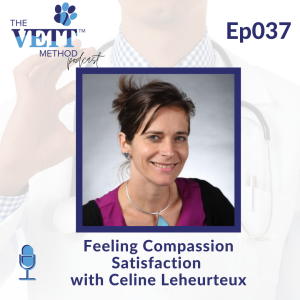
Thursday Apr 07, 2022
Feeling Compassion Satisfaction with Celine Leheurteux
Thursday Apr 07, 2022
Thursday Apr 07, 2022
Euthanasia could be the most common procedure people from the veterinary practice do. Almost every day, there’s one pet going through euthanasia after another.
However, talking about it has always been taboo, thus leading to the lack of education vet med people have with regards to the positive way of euthanizing animals that need to undergo the procedure.
With euthanasia being a time of high emotions and vulnerability, it is with no doubt that we, as professionals, need to be able to manage the emotions both our clients and ourselves go through.
But the question is, how can we actually do the practice as we deal with the emotional guilt of letting one’s life go, a move even more painful than divorce?
Join us today as we answer that question with Celine Leheurteux, the mind behind EUTHABAG.
Celine Leheurteux has been in small animal practice since 1999. She developed EUTHABAG, a pet body bag that impacted millions of people in critical moments of their life or career. It is now used in 25 countries by thousands of practices.
In this episode, Celine educates us about euthanasia as she puts emphasis on how people in the practice of veterinary medicine can honor the bond between the vet team, the pet, and the family in tears as they proceed on doing the euthanasia process.
What you will learn from this episode:
- Understand how the lack of education in euthanasia affects veterinary professionals’ euthanasia practice and protocols;
- Discover what EUTHABAG is and how much of great help it is in educating people with regards to euthanasia, especially on the details of how to properly do it; and
- Find out all the resources you’ll need in learning about euthanasia and having a better practice of veterinary medicine through books, handouts, and other materials from EUTHABAG
“Now, the difference is I know how to provide a positive euthanasia experience that people will forever remember and be grateful for. I’m making a difference. The euthanasia I’m going to lead is not gonna be the same as the one on the other side of the street. This is going to be different.” – Celine Leheurteux
Topics Covered:
01:20 – Celine talks about the first time EUTHABAG came into the market, as well as the inspiration that led to the birth of EUTHABAG
03:36 – Celine describes her ideal client: Any veterinary professional, from the receptionist to the veterinarian; those who provide compassion and who face euthanasia in the practice almost every day
04:15 – Problem she solves for her clients: Decreasing the level of stress around euthanasia and feeling compassion satisfaction by giving the best end-of-life care
05:36 – The typical symptoms/pain points: Unnecessary stress, cognitive disruption, impostor syndrome, compassion fatigue/burnout
08:55 – The mistakes: Not having enough training about euthanasia and providing vague guidelines/descriptions
12:27 – Celine’s Valuable Free Action: “Have your staff take our free CPD. There are so many tips in it. There are so many members in our teams now, it’s getting bigger and bigger, and there are so many things to talk about around euthanasia. I think everybody needs to have the same training so we can hope that any client that comes to our practice has the same kind of experience, some kind of standard.”
17:53 – Celine’s Valuable Free Resource: Go to EUTHABAG’s website – https://www.euthabag.com/ – to learn more about euthanasia and dealing with your pet’s death
24:58 – Q: What’s a tip I would like to share? A: “The biggest game-changer for me was to provide deep, profound sedation to the pet prior to euthanasia. It calms the animal, the family, and then us – the veterinary team. Everybody feels better, and there’s no more anticipation of a reaction from the pet.”
Key Takeaways:
“Veterinary professionals, because of lack of education, just don’t feel they’re bringing the best. We’re all perfectionists. We need to be on top of things. We need to feel like professionals. And because we’re missing education, we don’t feel totally competent, especially with the family in tears.” – Celine Leheurteux
“We have to deal with it. It’s something we cannot avoid. We have empathy. We have emotional intelligence. We have compassion. We have everything; we just don’t know what to do with it. We don’t know how to show that to people. So we just need to be guided. All that we’re missing is to feel that we’re doing the right thing because we love to be following the guidelines, we love to be in line with the rules, but with euthanasia, there are no guidelines. It’s just like, do how you think is good. But because we’re don’t speak the same language, we’re not in the same pants as our clients, we don’t do the thing in an optimal way necessarily.” – Celine Leheurteux
“Now, the difference is I know how to provide a positive euthanasia experience that people will forever remember and be grateful for. I’m making a difference. The euthanasia I’m going to lead is not gonna be the same as the one on the other side of the street. This is going to be different.” – Celine Leheurteux
“Provide deep, profound sedation to the pet prior to euthanasia.” – Celine Leheurteux
People / Resources Mentioned:
EUTHABAG’s website: https://www.euthabag.com/
EUTHABAG’s CPD: https://veterinaryeuthanasiaeducation.com/
Mary Gardner / Lap of Love: https://www.lapoflove.com/
Ways to Connect with Celine Leheurteux:
Email: celine@euthabag.ca
Website: https://www.euthabag.com/
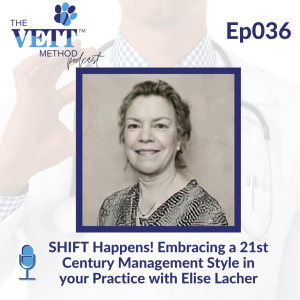
Thursday Jan 27, 2022
Thursday Jan 27, 2022
What is it that you want your practice to look like? What is it that you are trying to achieve?
There are veterinarians out there who are stuck in leadership concepts designed way old for today’s generation. Although they are smart and are fully knowledgeable about Vet Med, they lack training on how to lead a business in this modern world, hence the disappointments that come right after.
Henry Ford used to say, “I’m hiring you for your hands, not your head…”
But if we’ll look at it from a 21st-century perspective, that isn’t something that is still effective.
As much as it’s important to check on yourself, understanding how your employees are doing is also a key to success.
Learn how you can effectively lead the world of Vet Med in the 21st century as we interview Elise Lacher today.
Elise Lacher is a recovering social worker and a Certified Public Accountant who works with veterinarians to help them achieve their personal and professional goals.
In this episode, Elise discusses the power vulnerability has in achieving great heights in your business. Here, she talks about the importance of having the right team in making that shift towards better leadership this time.
What you will learn from this episode:
- Discover how giving the right tasks to the right people in your practice is a huge game-changer in the field;
- Understand why checking how your team’s doing is just as important as taking the time to reflect on yourself for how you’ve been working; and
- Find out how you can effectively lead your team in your practice in line with the trends that are happening in the 21st century.
“Be vulnerable with your team.”
– Elise Lacher
Topics Covered:
03:27 – Elise describes her ideal client: A veterinary practice owner who is disappointed with the culture in their practice and their unachieved goals
05:05 – Problem she solves for her clients: Changing the culture, being in alignment with why they wanted to become veterinarians in the first place, learning how to hire the right people
09:30 – The typical symptoms/pain points: High turnover of employees in the practice
12:18 – The mistakes: Trying to do it all on their own, thinking past styles of leadership are still going to work in the 21st century
16:17 – Elise’s Valuable Free Action: “You need to be vulnerable with your team. Share with them what you want to achieve then check in on them very often and regularly to find out what is going on.”
21:58 – Elise’s Valuable Free Resource: Visit the Strategic Veterinary Consulting Inc.’s website or go to Enlightened Rebels to learn more about 21st-century business practices in a vet clinic
22:57 – Q: Does it work? A: “It does impact work in a veterinary practice. The only way it works, however, is if you start doing something.”
Key Takeaways:
“When we’re in a public business, it’s really important that we have some of those soft skills which are really kind of hard skills – the communication, empathy, being able to talk with people, the emotional intelligence that we hear so much about today.” – Elise Lacher
“When you get the right team in helping you with what needs to be done, you really don’t have to be there in the wee hours of the morning, doing the things that you shouldn’t be doing.” – Elise Lacher
“My philosophy in running a business is kind of bordering on what Jim Collins wrote about in his book, Good to Great. You’ve got to get the right people, in the right seats, on the bus, going in the right direction.” – Elise Lacher
“Just because you’ve done them in a previous practice doesn’t mean that you can get it the way we want it done in our practice.” – Elise Lacher
“It does impact work in a veterinary practice. The only way it works, however, is if you start doing something.” – Elise Lacher
People / Resources Mentioned:
- Strategic Veterinary Consulting Inc.: https://strategicveterinaryconsulting.com/
- Enlightened Rebels: http://www.enlightenedrebels.net/
- The Ideal Team Player: How to Recognize and Cultivate The Three Essential Virtues (J-B Lencioni Series): https://www.amazon.com/Ideal-Team-Player-Recognize-Cultivate/dp/1119209595/ref=tmm_hrd_swatch_0?_encoding=UTF8&qid=&sr=
- Breene Brown’s TED Talk (The Power of Vulnerability): https://www.ted.com/talks/brene_brown_the_power_of_vulnerability
Ways to Connect with Elise Lacher:
- Email: elise@strategicveterinaryconsulting.com
- Website: https://strategicveterinaryconsulting.com/
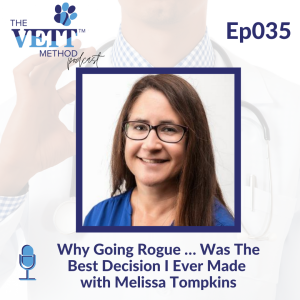
Thursday Jan 20, 2022
Why Going Rogue … Was the Best Decision I Ever Made with Melissa Tompkins
Thursday Jan 20, 2022
Thursday Jan 20, 2022
As people in Vet Med, we tend to be perfectionist people, trying to chase our goals the way we believe is effective.
However, whether we admit it or not, at some point, we’ll all reach that immense feeling of exhaustion that sometimes makes us think, ‘What am I doing? Would I ever get back to my passionate self?’
We dream so much of success that we end up miserably fearing failure in return.
Join us as we talk with Melissa about the benefits of having someone who has expertise in practice management.
Melissa Tompkins lives and breathes Veterinary Management. She is the owner of the South Coast Veterinary Management Solutions, is a Certified Veterinary Practice Manager, a Certified Compassion Fatigue Professional, and is credentialed in HR for the state of California. Melissa loves helping veterinary hospitals fulfill their goals and be successful.
In this episode, Melissa discusses the importance of having an expert help you in dealing with practice management as she shares tips and resources to help you become better in the field.
What you will learn from this episode:
- Understand why overreacting to a situation and not allotting time for the employees to adjust to change are huge mistakes in management;
- Discover what change curve and face training are all about; and
- Find out why you should ask for help from practice managers and let them do it once you recognize the struggle you’re in.
“Life is short. If you’re not happy with what you’re doing or you feel like you want to do more then just do it. I’ve seen so many people fail at something because they never actually tried. Just try. If you don’t ever make the leap, you’ll never be successful. We have this fear of failure instead of a belief that we’re going to succeed. Don’t be afraid of failing. Just assume that you’re going to be successful. And if you’re not, try again.”
– Melissa Tompkins
Topics Covered:
01:22 – Melissa describes her ideal client: Practice owner who knows that they need help and is willing to make changes to make his practice stronger
02:55 – Problem she solves for her clients: The lack of training for the team, employee morale and motivation or retention, client service issues, recognizing compassion fatigue, manager inventory, and manager expenses
06:33 – The typical symptoms/pain points: Physical and emotional symptoms like burnout, stress, and compassion fatigue
09:20 – The mistakes: (1) Reacting to one situation and making huge change because of it; (2) Not giving time for adjustments and communication when implementing necessary change
13:55 – Melissa’s Valuable Free Action: “Figure out what your biggest problem/struggle is, and then focus on how you can work with that problem. Also, find a practice manager if you’re struggling. Get some rest and take care of yourself.”
18:10 – Melissa’s Valuable Free Resource: Visit the following: American Animal Hospital Association, Veterinary Hospital Managers Association, American Veterinary Medical Association, and South Coast Veterinary Management Solutions
21:58 – Q: Why being rogue was the best decision I ever made? A: Life is short. If you’re not happy with what you’re doing or you feel like you want to do more then just do it. I’ve seen so many people fail at something because they never actually tried. Just try. If you don’t ever make the leap, you’ll never be successful. We have this fear of failure instead of a belief that we’re going to succeed. Don’t be afraid of failing. Just assume that you’re going to be successful. And if you’re not, try again.
Key Takeaways:
“There’s a lot of problems in practice management. Solving all of those problems is almost impossible, but I use my skills to try and help solve each problem as needed to be.” – Melissa Tompkins
“Schools could do wonders if they talk about emotional intelligence. If we learned that when we were younger, we would be so much more involved as adults.” – Melissa Tompkins
“Sometimes, it’s just nice to know that other people are struggling with your same exact problem. As a leader, you don’t get to share with your team that you’re stressed about something. So when you’re out with other leaders who are having the same experiences, that’s really huge.” – Melissa Tompkins
People / Resources Mentioned:
- South Coast Veterinary Management Solutions: https://southcoastveterinarymanagementsolutions.com/speaking/
- American Animal Hospital Association: https://www.aaha.org/
- Veterinary Hospital Managers Association: https://www.vhma.org/home
- American Veterinary Medical Association: https://www.avma.org/
Ways to Connect with Melissa Tompkins:
- Email: southcoastvetsolutions@gmail.com
- Website: https://southcoastveterinarymanagementsolutions.com/speaking/
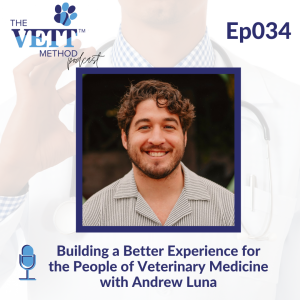
Thursday Jan 13, 2022
Building a Better Experience for the People of Veterinary Medicine with Andrew Luna
Thursday Jan 13, 2022
Thursday Jan 13, 2022
The United States is facing a lot of different crises nowadays, but only if we look closely, we’ll notice that Vet Med’s situation is far worse than everything else.
Employers spend thousands only to receive no application; job seekers have a poor experience and eventually fail to land the job they deserve.
Statistics say that by 2030, 75 million pets won’t have access to pet care, but as much as we want to counter that, we can’t, because our resources aren’t that efficient.
Right now, what we need is an initiative towards the industry’s betterment. Good thing Hound is here to guide us to take the first step.
Andrew Luna is the CEO of Hound and the Founder of The Pet Care Collective. He is incredibly passionate about culture and people and is building solutions for a better and brighter future in veterinary medicine.
In this episode, Andrew speaks his heart out as he talks about the critical state of Vet Med in today’s time. Here, he shares how Hound can help make the industry better by guiding people towards the betterment of its whole.
What you will learn from this episode:
- Discover the crisis being faced by the Vet Med industry nowadays;
- Understand how poor job search practice and experience play a huge role in the industry’s crisis; and
- Find out how to be more successful in your practice as you dive into Hound’s guide in creating a culture that assures you a better Vet Med experience.
“Hound cannot do this alone. We’re solving one key piece that we think is really important. We want to make Vet Med more attractive, more sustainable, and keep people in the industry. But we need an entire collection of veterinary professionals, of businesses unifying to solve this problem together.” – Andrew Luna
Topics Covered:
01:22 – Andrew describes his ideal client: Independent or corporate consolidator in the United States that is hiring people
01:51 – Problem he solves for his clients: The crisis in veterinary medicine, as well as the occurrence of high employee turnover in the US
02:56 – The typical symptoms/pain points: The employers are wasting a ton of money posting jobs but receiving no applications while the job seekers have really poor job search and on-boarding/hiring experience
04:27 – The mistakes: Paying thousands of dollars for job posting, using ineffective tools, and having a 15-30% placement fee of veterinarians
05:51 – Andrew’s Valuable Free Action: “You can go to https://www.hound.vet and sign up for free.”
09:42 – Andrew’s Valuable Free Resource: Read The Ultimate Guide for Awesome Culture in Veterinary Medicine and learn how you can create a great culture in your environment
11:52 – Q: “Why?” or “Why now?” A: My why: I worked for four years in emergency health. I just intimately know the problems that we’re all facing in this industry and I sincerely want to solve them. I care a lot about this industry. I care a lot about the people. It blows my mind that nobody has done this already. Why now? Quite simply. The industry is growing. Pet owner demand is booming. Banfield has projected that maybe 75 million pets will not have access to care by 2030; however, our people are struggling. The practices can’t keep up. And if this persists, then I think that in the next five to 10 years, Vet Med could be in a pretty sticky spot.”
Key Takeaways:
“What we’re looking to do is we’re looking to build solutions that make it much easier and different in Vet Med to hire, recruit, and define jobs. We’re building a better experience for the people throughout their employee journey, starting with job search. We will soon also be releasing tools to create a better experience to those who are employed by their employer and supporting the employer in enriching the employment of their employees.” – Andrew Luna
“We’re in a state right now. The industry is really hurting. Everyone that I speak to – all my friends in the industry, veterinary and the HR – are all struggling, and the tools that they have access to today simply weren’t built for veterinary medicine. They’re not customized; they’re not solving the unique friction of this industry. So, Hound is coming in on building tools specifically for people in veterinary medicine.” – Andrew Luna
“Hound is here to create a better, more efficient, a newer, different way to manage this entire journey.” – Andrew Luna
“I care a lot about this industry. I care a lot about the people. It's a wonderful, beautiful industry, but we’ve got a lot of stuff that we need to fix. It blows my mind that nobody has done this already.” – Andrew Luna
“The industry is growing. Pet owner demand is booming. Banfield has projected that maybe 75 million pets will not have access to care by 2030; however, our people are struggling. The practices can’t keep up. And if this persists, then I think that in the next five to 10 years, Vet Med could be in a pretty sticky spot.” – Andrew Luna
People / Resources Mentioned:
- Hound
- Hound’s Blogs
- The Ultimate Guide for Awesome Culture in Veterinary Medicine
- The Pet Care Collective
Ways to Connect with Andrew Luna:
- Email: andrew@hound.vet
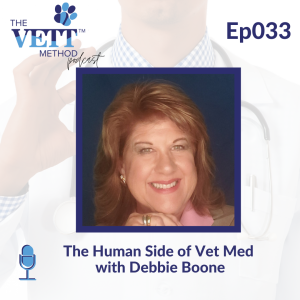
Thursday Nov 11, 2021
The Human Side of Vet Med with Debbie Boone
Thursday Nov 11, 2021
Thursday Nov 11, 2021
As it is in human nature to be negative and fearful of the difficult and unknown, we most of the time tend to put more focus on looking for mistakes in the picture.
Did you know that it is through effective communication that every occurring problem gets to be cleared and solved?
You have to take the time to listen to what your team has in mind because more often than not, their ideas are actually better than yours.
Dig deep into the emotional aspect of practice and be driven by the purpose of you walking into that door every day as we interview Debbie Boone!
Debbie Boone strives to improve the lives of humans and animals by sharing her 35 years of experience and her communication expertise to enhance workplace culture, practice success, and the well-being of veterinary teams. She serves as the Vice President of VetPartners, and is hosting a podcast on YouTube called “The Bend”.
In this episode, Debbie talks about the key to the kingdom – the human part of Vet Med. Here, she mentions how improvement in human performance connects to the overall betterment of hospital performance, alongside the need to change focus towards positivity and the team learning effective communication skills.
What you will learn from this episode:
- Discover the reason why you shouldn’t rule your people to behave the way you want them to behave;
- Understand the causes of the dysfunction that’s present in your team; and
- Find out what the biggest game-changer in the Vet Med practice is.
“The truth in the matter is that if you don’t communicate well, you don’t get to practice medicine.” – Debbie Boone
Topics Covered:
03:14 – Debbie describes her ideal client: Practice owners who are looking for someone to coach them to improve their hospital performance.
04:17 – Problem she solves for her clients: Veterinarians’ challenges on their leadership in training phase – understanding how to motivate their people to lead the team and focus on the mission of the practice.
06:28 – The typical symptoms/pain points: A dysfunction – callouts, drama, low profitability, etc. – appear in the staff.
07:21 – The mistakes: Trying to rule people into behaving the way you want them to behave.
09:15 – Debbie’s Valuable Free Action: “Look for positive things to praise rather than look for mistakes to fuss about.”
11:44 – Debbie’s Valuable Free Resource: Visit Debbie’s website to access her blog and her recommended reading list of leadership books.
13:24 – Q: What is the biggest problem in Veterinary Medicine? A: The lack of advanced communication skills.
Key Takeaways:
“In my mind, improving the hospital performance requires improving the human performance in that practice. Some people like to look at numbers, and numbers are easy. The human part is the hard part, but the human part is the part that is the key to the kingdom.” – Debbie Boone
“A lot of people know that something needs to change. They just don’t know what it is and how they do it.” – Debbie Boone
“If your core values are different from those of your team members, there is always going to be discord there. You’ve got to make sure that everybody’s on the same page of beliefs with what you believe in and what it is that you want.” – Debbie Boone
“It’s so important that we get people to be purpose-driven and constantly illuminate the path to the purpose by walking in the door every day, rather than trying to beat them into submission.” – Debbie Boone
People / Resources Mentioned:
Ways to Connect with Debbie Boone:
- Email: dboone@dboone2managevets.com
- Website: https://dboone2managevets.com
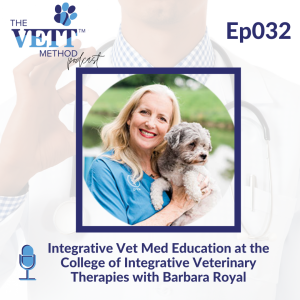
Thursday Nov 04, 2021
Thursday Nov 04, 2021
Have you noticed that whenever our loved ones get sick, we always tend to put more focus on the disease itself instead of understanding the underlying problem that’s present in that case?
That also happens in the world of vet med!
Sometimes, veterinarians pay more attention to solving the bigger problem, when in reality, it’s the small symptoms beneath the patient’s serious case that needs to receive care.
How can we truly provide health to animals? How can we truly help our pets live healthy life?
There’s so much we can do to keep everything on this planet nourished, but the endpoint is that we need to know what it is that they truly need!
Get to know more about your pets’ needs as we talk with Barbara Royal today!
Barbara Royal founded two integrative practices in the Chicago area. She is the author of several books and is the CEO of the College of Integrative Veterinary Therapies which is a global online learning platform for integrative Veterinary Medicine in order to provide better integrative education for practicing veterinarians.
In this episode, Barbara unravels the world of integrative veterinary therapy as she reminds people that there’s more to health than just the presence of surgeries and medicines. Here, she talks about why awareness in relation to an animal’s ancestral need is a must, as well as what happens when an individual gets disconnected from health and its nature.
What you will learn from this episode:
- Discover the world of integrative veterinary therapy and how big of a game-changer it is for you and your pets;
- Understand the importance of not being ignorant towards the ancestral needs of the species of the animal you’re with; and
- Find out how you can deal with being lost on track through tips and resources inclined to veterinary therapy.
“Consider our animals more like little humans.” – Barbara Royal
Topics Covered:
03:19 – Barbara describes her ideal client: Anyone that’s open to the idea that there is a little bit more to health than just providing medicines and surgeries.
07:11 – Problem she solves for her clients: People not knowing where to go and being disconnected from health, especially that situation where they fail to easily find resources they need towards change.
12:18 – The typical symptoms/pain points: A health issue that always starts small, with it beginning as a little chronic problem, and it just keeps on growing into a bigger problem through time.
14:42 – The mistakes: Not paying attention to the ancestral needs of the species of the animals you’re with.
19:05 – Barbara’s Valuable Free Action: “Whether you have a dog or cat or you just really want to step into this but you’re a little bit afraid, just add some fresh food. My easiest go is eggs. It can be raw, it can be cooked, it can be whatever, or add a little bit of meat or sardines. Add something fresh to their diet and see what happens. You would be surprised at how excited they get and how much healthier they start to look.”
21:27 – Barbara’s Valuable Free Resource: Visit websites of College of Integrative Veterinary Therapies, Royal Animal Health University, and American Holistic Veterinary Medical Association.
22:56 – Q: How do we know we’ve gone off track? How do we know that there’s a problem? A: When your pets walk, do you think “vibrant health, amazing, this dog’s going to live forever” or not? The vibrant health thing should be from puppyhood all the way ‘til they’re gone. Start to pay attention to what is natural and healthy. It will help you and your pets. Remember to ask the question why.
Key Takeaways:
“For me, it’s always about what is this animal? Because again, working with so many different species of animals in my past, I’m always thinking now with each one. What’s this species in front of me? What’s the best way for it to be healthy?” – Barbara Royal
“I’m not good enough as a veterinarian that can heal every single thing, but the body is. The body is amazing. You give it the tools and it’ll say I got it!” – Barbara Royal
“Whether you have a dog or cat or you just really want to step into this but you’re a little bit afraid, just add some fresh food. My easiest go is eggs. It can be raw, it can be cooked, it can be whatever, or add a little bit of meat or sardines. Add something fresh to their diet and see what happens. You would be surprised at how excited they get and how much healthier they start to look.” – Barbara Royal
“Start to pay attention to what is natural and healthy. It will help you and your pets.” – Barbara Royal
People / Resources Mentioned:
- College of Integrative Veterinary Therapies
- Royal Animal Health University
- Animal Diet Formulator
- American Holistic Veterinary Medical Association
Ways to Connect with Barbara Royal:
- Email: drbarbararoyal@gmail.com
- Website: https://www.civtedu.org/

